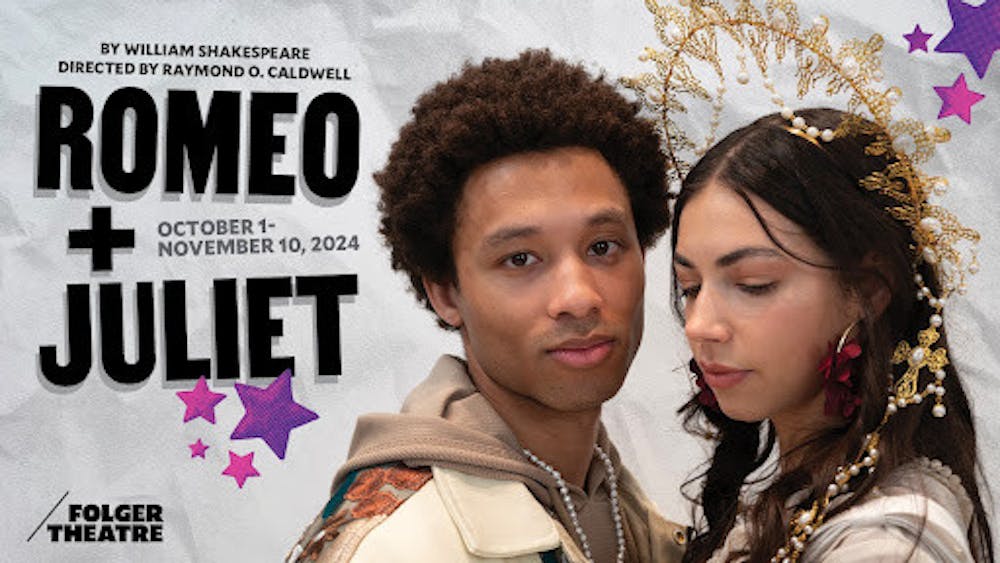The Folger Theatre reimagines “Romeo and Juliet” to answer questions of love versus politics and the consequences of a polarized society from award-winning director Raymond O. Caldwell, now until Nov. 10.
Caldwell’s take on “Romeo and Juliet” heightens the conflict between the Capulets and Montagues by making the families representative of modern political opponents instead of families of different socioeconomic classes.
The polarizing political and electoral backdrop of Verona, Italy is introduced through projections and screens that cover the stage. The audience is shown a rotating cycle of “political ad” videos containing different characters addressing the public of Verona, through a speech that informs the audience of their political beliefs.
Although neither family is labeled as Democrat or Republican, Lady Montague and her family are distinctly dressed in shades of blue while Capulet and his family are dressed in shades of red, likely in reference to today’s two major political parties.
These pre-recorded political speeches, stylized in the families’ respective colors, portray Lady Montague’s character as a stand-in for Vice President Kamala Harris and Capulet’s character is a caricature of former President Donald Trump.
At the end of her introductory speech to the people of Verona, Lady Montague’s character recites Harris’ viral coconut tree quote in Shakespearean English along with one of Harris’ signature jolly laughs.
In Capulet’s case, his character’s thick Southern accent, pro-gun policy and shady business practices could be interpreted as playing off of stereotypes surrounding some more right-leaning Americans in Trump’s voter base.
When conceptualizing the play’s environment and the lives of the characters, Caldwell said in a press release, “... the nerd in me was inspired to imagine a modern Shakespearean ‘metaverse.’”
The show also takes place in what Caldwell calls a modern “Shakespearean metaverse.” Projections, screens, Instagram, Amazon Prime and Apple TV+ make up only some of the new technologies within the world of Caldwell’s “Romeo and Juliet.”
In modernizing the classic play, butterfly knives replaced rapiers, a six-pack of beer replaced goblets of wine, a stepladder helped Romeo reach Juliet’s balcony, the black market replaced an apothecary’s shop and FaceTime replaced letters and carrier pigeons.
The contemporary take is reflected in the show’s casting as well. The adaptation features mainly women of color in major roles of authority, namely Lady Montague, who is the matriarch of the Montague household and a political candidate in Verona. The show also features the typically male-presenting roles of Mercutio, Tybalt and Prince of Verona played by female-presenting actors.
Some of the female-presenting roles in Caldwell’s rendition of “Romeo and Juliet” also feature bilingual performers. Juliet, the Nurse and Lady Capulet deliver the lines in their scenes in Spanish, with subtitles featured on a screen above the stage for the audience to read. Juliet and her family, except for her father, speak both Spanish and English in the Capulet household, adding even more complexity to the Capulet and Montague feud.
Caldwell’s contemporary and politically relevant adaptation of “Romeo and Juliet” expertly demonstrates the Folger Theatre’s fall 2024 theme, dubbed “Whose Democracy?” which highlights political power and civic participation in classical works.
Through the political environment depicted in Verona, Italy and a polarizing election cycle that mirrors the 2024 election, Folger Programming Director Karen Ann Daniels said in a press release that Caldwell’s rendition of “Romeo and Juliet” “is an opportunity for us to stop and think about the next generation as we enter this hyper-political and often divisive season in our country.”
“Romeo and Juliet” will continue its run at the Folger Theatre until Nov. 10.
Correction: A previous version of this article referred to the theater as the Folger Shakespeare Theater. It has been updated to correctly say the Folger Theatre.
This article was edited by Jessica Ackerman, Marina Zaczkiewicz and Abigail Turner. Copy editing done by Luna Jinks, Ariana Kavoossi, Emma Brown and Charlie Mennuti.





